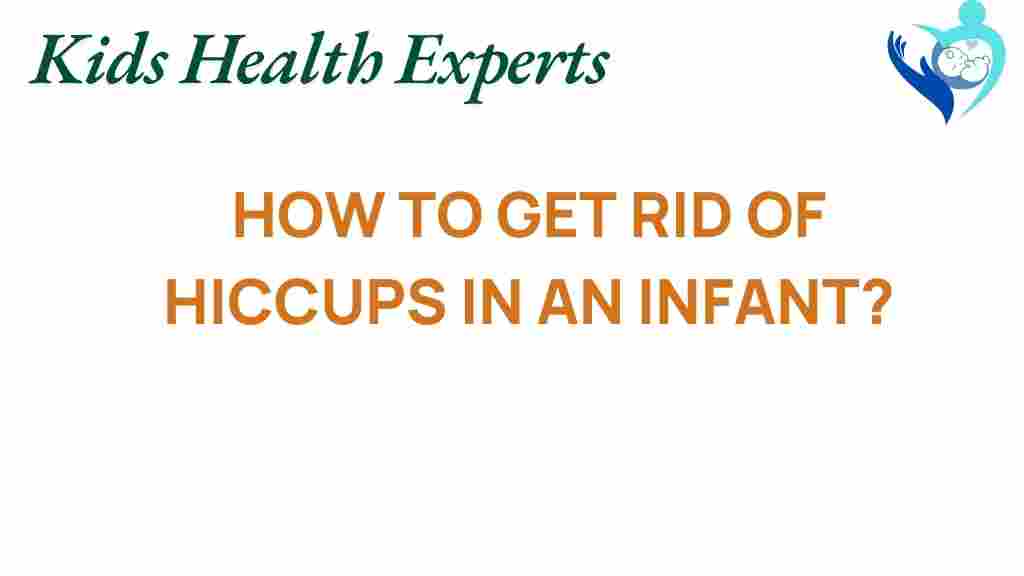Unlocking the Mystery: How to Effectively Alleviate Hiccups in Infants
As a parent, you may have encountered the puzzling phenomenon of infant hiccups. These involuntary contractions can cause concern, especially for first-time parents. Understanding why hiccups occur and how to alleviate them is essential for ensuring your baby’s comfort and health. In this article, we will explore various soothing techniques, pediatric advice, and practical parenting tips to help you effectively manage this common baby issue.
Understanding Infant Hiccups
Hiccups occur when the diaphragm, a muscle at the base of the lungs, spasms involuntarily. This response can happen for several reasons, particularly in infants. Here’s why your little one may be experiencing these hiccups:
- Feeding: Rapid feeding or swallowing air can trigger hiccups.
- Temperature changes: Sudden changes in temperature may cause the diaphragm to contract.
- Excitement or stress: Emotional changes can also lead to hiccups.
While hiccups are generally harmless and tend to resolve on their own, knowing how to soothe your baby can ease your worries and improve their comfort. Let’s delve into effective soothing techniques for managing infant hiccups.
Soothing Techniques for Infant Hiccups
When your baby experiences hiccups, there are several methods you can try to alleviate them:
- Change Feeding Position: Adjusting your baby’s position during feeding can help minimize air intake. Hold your baby upright and ensure they latch properly.
- Burp Your Baby: Frequent burping during and after feedings can help release trapped air. Aim to burp your baby every 2-3 ounces if bottle-feeding, or every few minutes if breastfeeding.
- Use a Pacifier: Sucking on a pacifier can help relax your baby’s diaphragm and may stop hiccups.
- Offer a Small Amount of Water: For older infants, a small sip of water can sometimes help soothe hiccups.
- Gentle Tummy Massage: Massaging your baby’s tummy in a clockwise direction can help relax the diaphragm.
These techniques can be effective, but it’s essential to approach each situation calmly and patiently. If hiccups persist for an extended period, consider consulting your pediatrician for further advice.
Pediatric Advice on Managing Hiccups
Consulting with your pediatrician can provide additional insights into managing infant hiccups. Here are some expert recommendations:
- Monitor Feeding Habits: Pay attention to how your baby feeds. If hiccups are frequent, consider evaluating their feeding patterns with your pediatrician.
- Keep a Hiccup Diary: Document when hiccups occur, their duration, and any accompanying symptoms. This information can help your pediatrician identify underlying issues.
- Avoid Overfeeding: Overfeeding can lead to excess air intake, worsening hiccups. Follow your baby’s hunger cues and avoid forcing feedings.
Understanding your baby’s unique needs is crucial for their overall baby health. If you notice any worrying signs, such as hiccups accompanied by distress or difficulty breathing, seek medical attention immediately.
Common Baby Issues Related to Hiccups
While hiccups in infants are usually benign, they can sometimes be a symptom of other common baby issues. Here are a few conditions to be aware of:
- Reflux: If your baby frequently experiences hiccups along with spitting up, it might be a sign of gastroesophageal reflux (GERD).
- Colic: Persistent crying and fussiness in addition to hiccups may indicate colic, which can be distressing for both baby and parents.
- Food Allergies: In rare cases, hiccups may be associated with food allergies or intolerances. Watch for other symptoms, such as rash or gastrointestinal distress.
By being aware of these potential issues, you can better address your baby’s needs and seek timely pediatric advice when necessary.
Troubleshooting Persistent Hiccups
If your baby frequently experiences hiccups, consider these troubleshooting tips:
- Keep Feeding Times Calm: Create a soothing environment during feedings to reduce stress and excitement.
- Adjust Bottle Nipple Size: If bottle-feeding, ensure the nipple size is appropriate for your baby’s age to prevent excess air intake.
- Limit Stimulating Activities: Avoid overwhelming your baby with loud noises or rapid movements right after feedings.
These steps can help reduce the frequency of hiccups and improve your baby’s overall comfort during feedings.
Conclusion: Embracing Parenthood with Confidence
Managing infant hiccups is a common challenge many parents face. By understanding the causes and implementing effective soothing techniques, you can alleviate your baby’s discomfort and enhance their overall well-being. Remember to consult your pediatrician if hiccups persist or are accompanied by other concerning symptoms.
Parenting is a journey filled with learning experiences. Embrace the challenge of addressing common baby issues, and know that with patience and the right tools, you can ensure your baby thrives. For further reading on baby health and parenting tips, visit Baby Health Resources. For expert insights on pediatric care, consider checking Pediatric Advice for New Parents.
This article is in the category Care and created by KidsHealthExperts Team
